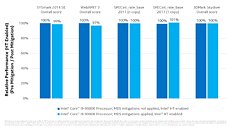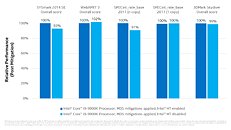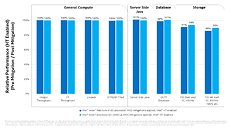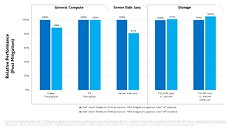Wednesday, May 15th 2019

Intel Puts Out Benchmarks Showing Minimal Performance Impact of MDS Mitigation
Intel Tuesday once again shook the IT world by disclosing severe microarchitecture-level security vulnerabilities affecting its processors. The Microarchitectural Data Sampling (MDS) class of vulnerabilities affect Intel CPU architectures older than "Coffee Lake" to a greater extent. Among other forms of mitigation software patches, Intel is recommending that users disable HyperThreading technology (HTT), Intel's simultaneous multithreading (SMT) implementation. This would significantly deplete multi-threaded performance on older processors with lower core-counts, particularly Core i3 2-core/4-thread chips.
On "safer" microarchitectures such as "Coffee Lake," though, Intel is expecting a minimal impact of software patches, and doesn't see any negative impact of disabling HTT. This may have something to do with the 50-100 percent increased core-counts with the 8th and 9th generations. The company put out a selection of benchmarks relevant to client and enterprise (data-center) use-cases. On the client use-case that's we're more interested in, a Core i9-9900K machine with software mitigation and HTT disabled is negligibly slower (within 2 percent) of a machine without mitigation and HTT enabled. Intel's selection of benchmarks include SYSMark 2014 SE, WebXprt 3, SPECInt rate base (1 copy and n copies), and 3DMark "Skydiver" with the chip's integrated UHD 630 graphics. Comparing machines with mitigations applied but toggling HTT presents a slightly different story.In the second graph (above), you'll see a comparison between two machines, both of which have the MDS mitigations, but one machine has HTT enabled, and the other has HTT disabled. The selection of tests is the same as the first graph. Here, you'll see performance either drop by 8 percent on SYSmark 2014 SE, and by 9 percent on SPECInt rate base (n copy), to practically no difference in 3DMark "Skydiver." and a negligible 2 percent gain with WebXprt 3 (less parallelized tests tend to benefit from HTT being disabled). Intel put out a similarly extensive selection of Data Center-relevant tests showing negligible performance impact with its MDS mitigation and recommended HTT setting on Xeon enterprise processors released after 2017.
Source:
Intel
On "safer" microarchitectures such as "Coffee Lake," though, Intel is expecting a minimal impact of software patches, and doesn't see any negative impact of disabling HTT. This may have something to do with the 50-100 percent increased core-counts with the 8th and 9th generations. The company put out a selection of benchmarks relevant to client and enterprise (data-center) use-cases. On the client use-case that's we're more interested in, a Core i9-9900K machine with software mitigation and HTT disabled is negligibly slower (within 2 percent) of a machine without mitigation and HTT enabled. Intel's selection of benchmarks include SYSMark 2014 SE, WebXprt 3, SPECInt rate base (1 copy and n copies), and 3DMark "Skydiver" with the chip's integrated UHD 630 graphics. Comparing machines with mitigations applied but toggling HTT presents a slightly different story.In the second graph (above), you'll see a comparison between two machines, both of which have the MDS mitigations, but one machine has HTT enabled, and the other has HTT disabled. The selection of tests is the same as the first graph. Here, you'll see performance either drop by 8 percent on SYSmark 2014 SE, and by 9 percent on SPECInt rate base (n copy), to practically no difference in 3DMark "Skydiver." and a negligible 2 percent gain with WebXprt 3 (less parallelized tests tend to benefit from HTT being disabled). Intel put out a similarly extensive selection of Data Center-relevant tests showing negligible performance impact with its MDS mitigation and recommended HTT setting on Xeon enterprise processors released after 2017.




31 Comments on Intel Puts Out Benchmarks Showing Minimal Performance Impact of MDS Mitigation
By the way, did you notice that Intel's 52-week stock price is at a low? Might be a good time to buy. We're going to be seeing a dedicated GPU and some MCM goodness in the future, right? :roll:
AMD might hit $40 off this in the summer... (if the trade talks don't completely implode).
But then, Jim Keller is working at intel now, and has been for a while. Might be time to go all in on the next round.
/s
Ofc, this is with all mitigations VS just MDS ones, so there's that ...